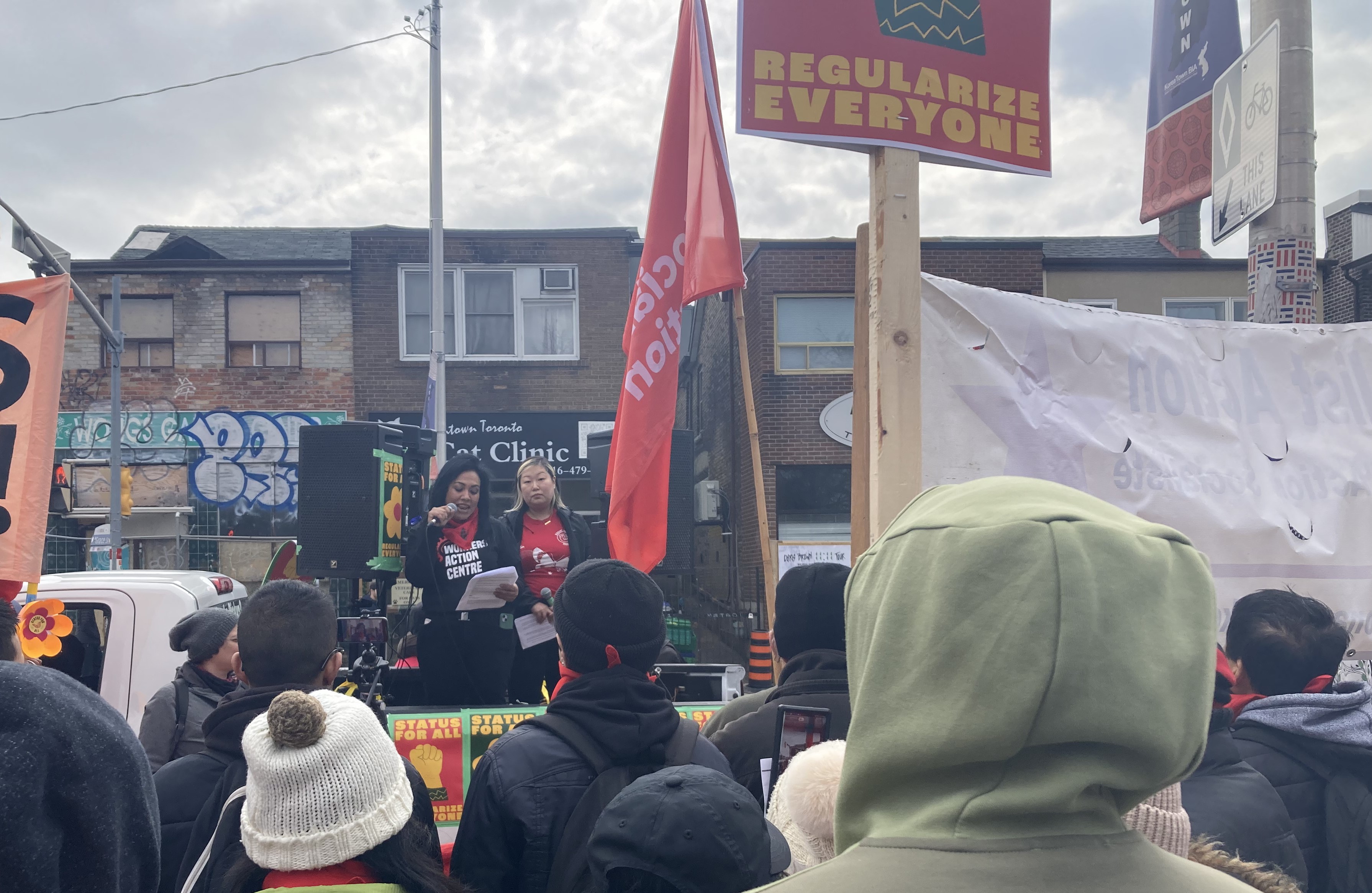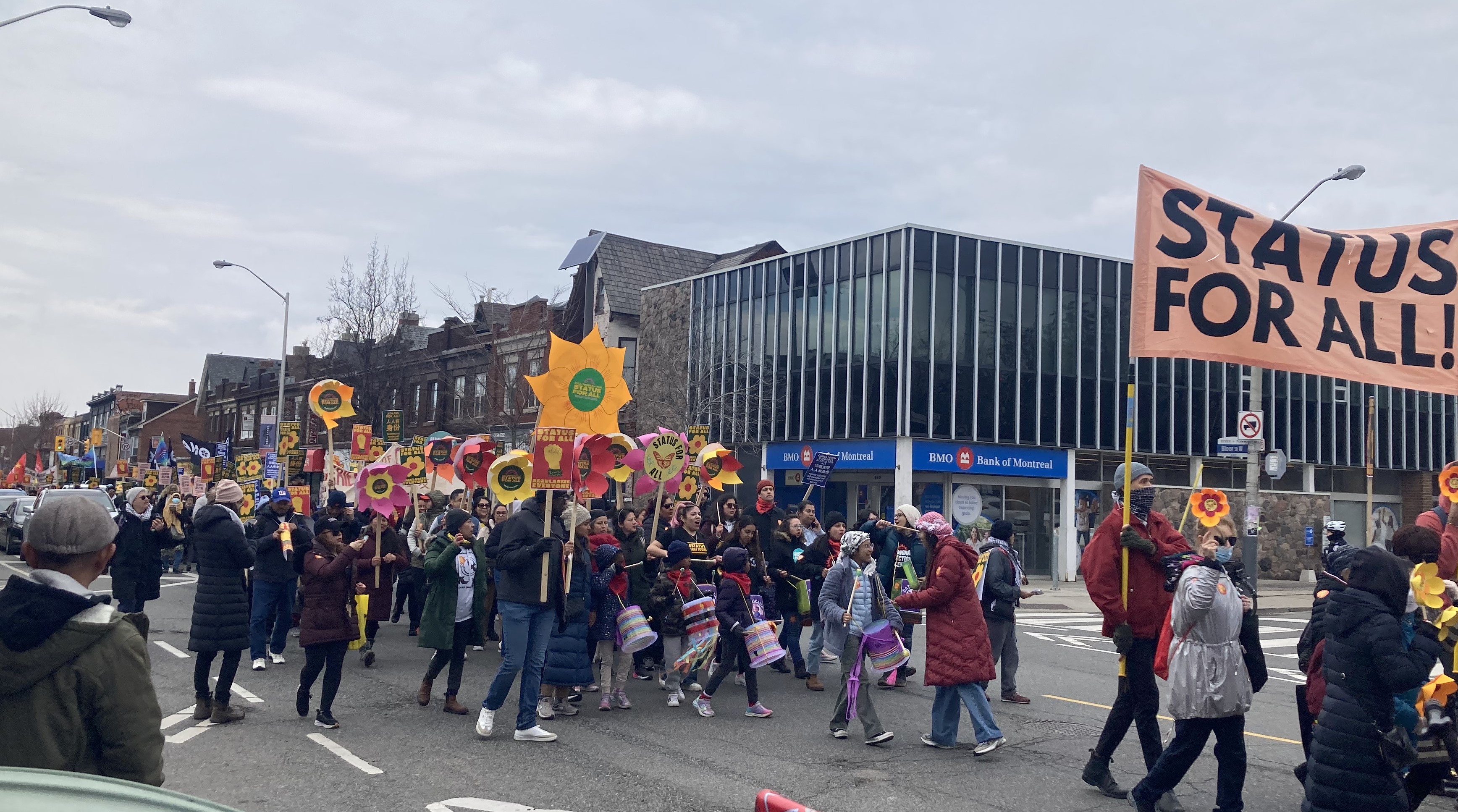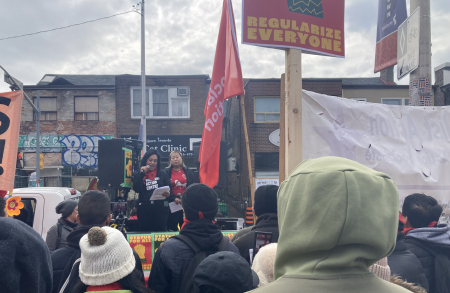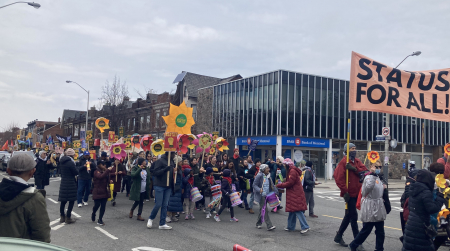Migrant Spring Marches Held Across Canada, Calling for Status for All
Migrant Spring Marches Held Across Canada, Calling for Status for All

A series of nationwide demonstrations for migrant workers rights were held across eight Canadian cities this weekend.
Supporters in Toronto gathered at Christie Pits Park on Saturday demanding permanent residency status for all undocumented people in Canada. The “Migrant Spring” protest also called on the federal government to remove unfair immigration requirements for care workers and to end deportations immediately.
The protest was organized by the Migrant Rights Network (MRN), the first and largest migrant-led Canada-wide coalition. Syed Hussan, executive director of the Migrant Workers Alliance for Change, which is part of the MRN, said that Canada must give status to every undocumented person without delay.
“Without permanent resident status, it's not possible for most people to assert their right to work, access education, access healthcare, or access any of the basic and essential services we all need,” Hussan tells the Media Co-op.

Demonstration MC Veronica from Workers Action Centre delivers a speech to the crowd at Christie Pits Park. Photo: Andrew Oliphant.
Still no announcement on regularization
Immigration, Refugees and Citizenship Canada (IRCC), a department of the federal government, said last June that it was committed to “implementing an initiative that will regularize those without immigration status who have been contributing to Canadian communities.” That announcement came after organized efforts put pressure on the government to create a plan to give permanent status to undocumented residents. In 2021, IRCC first spoke about working on a regularization plan.
In December 2023, Immigration Minister Marc Miller announced that the IRCC would begin rolling out the new regularization program in the spring of 2024, but there is still no date set. He pledged to create a program for undocumented immigrants already living in Canada, though he only highlighted specific industries and skilled workers.
During that announcement, Miller reiterated Canada will need immigrants to support its aging population. Over the next decade, millions of Canadians are moving out of the workforce and becoming more dependent on the healthcare system. Immigrants are being used as a way to deal with this shift. Miller also emphasized that Canada’s recent rising inflation and housing crisis was not caused by immigration — that it’s been 30 to 40 years in the making, caused by poor policy from both Liberal and Conservative governments. However, IRCC has since implemented a number of immigration regulations targeting specific, racialized immigrant communities.
Canada announced that it will be capping the total number of international students at 360,000, a 36% decrease from 2023. The cost-of-living requirements will now be doubled for international students, meaning they will need over $20,000 to prove they have the necessary funds to live as a student. Many international students are forced to take out loans and sell off family equity to pay for the high cost of living and tuition in Canada.
The international student visa only allows students to work 20 hours a week, which causes unsafe working conditions for thousands. If they are caught working more, it can lead to deportation. Many students work cash jobs, accepting dangerous or volatile positions to support themselves in school. In November 2022 the IRCC issued a temporary policy allowing students to work over 20 hours on school holidays and summer breaks, but the policy ended in December.
The government is also set to end its caregivers pilot program, which launched in 2019, on June 17. The program brings thousands of workers to support Canada’s most vulnerable individuals.
Cesara Ilustre is a part-time housekeeper from the Philippines who attended the demonstration. She has been in Canada for five years.
“We help the country, we grow food, we take care of the elderly, we take care of children, we are a part of building this country,” Ilustre said. “So when everyone has status, everyone can re-contribute to the economy of Canada”
Restrictions on Mexican immigration
The government recently instituted visa requirements specifically for all Mexicans, due in large part to record high asylum claims in 2023. Many Mexicans are seeking asylum from dangerous living conditions, fleeing from local cartels and governments. The Canadian government said that the new requirements will “relieve pressure” on Canada’s housing and social services, despite what the minister had said previously about the dangers of attributing the housing crisis to immigration.
Alexis, an undocumented worker from Mexico, has been in Canada for five years. He said that during his time in Toronto, he’s experienced living with multiple people in one bedroom, paying out of pocket for health care, and fearing the possibility of deportation — all while navigating the higher cost of living in Canada. Many Mexicans come to Canada on temporary worker’s visas only to be underpaid, underserviced and overworked on the frontlines of Canada’s economy.
“As an immigrant, you feel like everything's going to change for you, but then you realize that you don't have those same benefits as someone that has documents,” Alexis said.
“We try to do the best we can to contribute to the economy, to the community. But we also need benefits and support. We’re not only coming here to work for [Canadians].”

Protest moving eastbound on Bloor Street. Photo: Andrew Oliphant.
Getting organized, taking to the streets
Hundreds of demonstrators braved the cold winds on Saturday. Impassioned speeches — delivered both in English and Spanish — food, and families beating on colourfully painted plastic bins kept the energy levels high. The crowd chanted and cheered eastbound on Bloor, stopping at Bathurst and ending with a sit-in next to Deputy Prime Minister’s Chrystia Freeland’s office at Spadina and Bloor.
Many speeches showed support and solidarity to Palestinian and Sudanese asylum seekers. The Canadian government has been hesitant to offer aid to these countries, capping applications for Sudanese and Palestinians who live in Gaza at 3,250 and 1,000 people respectively, despite the immense and immediate humanitarian aid that Sudanese and Palestinians require. Since 2022, Canada has approved nearly one million temporary visas for Ukrainians fleeing the conflict with Russia.
Gig Workers United, Friends of Chinatown, the Ontario Nurses’ Association and other labour groups were represented at the protest.
Javier Ardoleza, a member of Migrante Ontario, a Filipino-based labour group, believes that this united action will have an impact on the Canadian government.
“If it's a small group, they are not going to listen,” he said. “But with more people, with more migrant organizations that will work for status for all, the Canadian government — especially the IRCC — will have to listen to the call of the migrants.”
The IRCC has yet to announce any update on its regularization promise, but Hussan said that the Migrant Workers Alliance for Change will continue to keep putting pressure on the government, and is coordinating a phone zap campaign on March 21.
“We are migrants speaking and organizing for ourselves,” Hussan said. “It is crucial that no decisions are made about our lives without us.”




